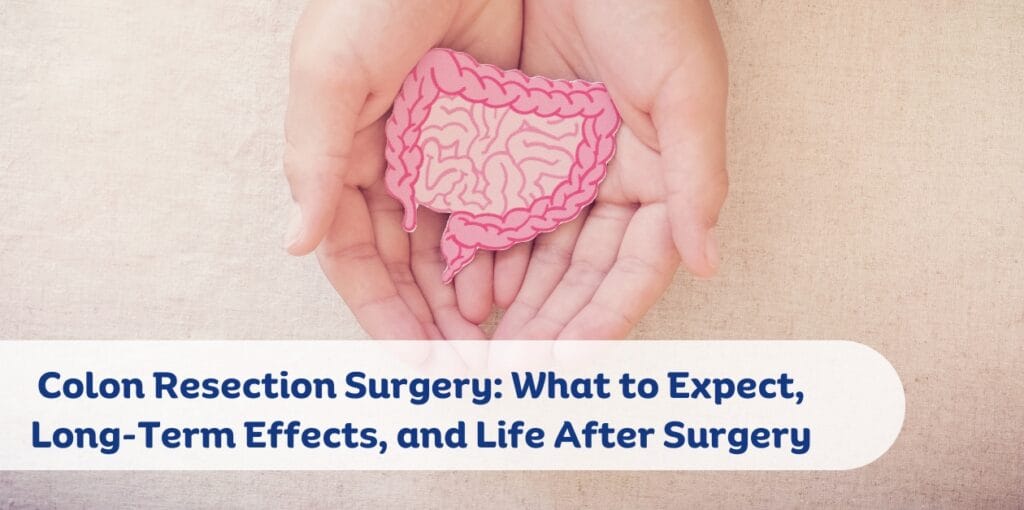Colon Resection Surgery: What to Expect, Long-Term Effects, and Life After Surgery

Colon resection, medically known as colectomy, is a surgical procedure to remove part or all of the colon. This intervention is often necessary for treating conditions like colorectal cancer, diverticulitis, inflammatory bowel diseases (IBD), and severe intestinal obstructions. While this surgery can be life-saving, it comes with challenges and lifestyle changes. This article provides a detailed understanding of the procedure, its potential long-term side effects, and insights into life expectancy after colon resection.
What is Colon Resection?
Colon resection involves removing the damaged or diseased segment of the colon. Depending on the patient’s condition, surgeons may reconnect the healthy parts of the colon (primary anastomosis) or create a temporary or permanent stoma (colostomy).
Types of Colon Resection
- Partial Colectomy: Removal of only the affected part of the colon.
- Total Colectomy: Removal of the entire colon, sometimes required for extensive disease.
- Hemicolectomy: Removal of the left or right side of the colon.
- Proctocolectomy: Removal of both the colon and rectum, often used for certain cancers or severe IBD cases.
Why is Colon Resection Necessary?
The decision to undergo colon resection is typically based on the severity of the underlying condition. Common indications include:
- Colorectal Cancer: The most common reason for colon resection. Removing the tumor and nearby lymph nodes is essential to prevent the spread of cancer.
- Diverticulitis: Chronic or recurrent diverticulitis may necessitate surgery to avoid complications like perforations or abscesses.
- Inflammatory Bowel Diseases: Conditions such as Crohn’s disease or ulcerative colitis often lead to severe damage requiring resection.
- Bowel Obstructions: When non-surgical methods fail to alleviate blockages caused by tumors, scar tissue, or volvulus.
The Surgical Process
Preoperative Preparation
Patients may undergo various tests such as blood work, imaging studies, and a colonoscopy. A bowel cleansing regimen is typically required before surgery. Your surgeon will discuss the type of resection, anesthesia, and recovery expectations.
During Surgery
Colon resection can be performed using two techniques:
- Open Surgery: Involves a larger incision for direct access to the colon.
- Laparoscopic Surgery: A minimally invasive approach using small incisions and a camera for guidance.
Postoperative Care
Post-surgery, patients are monitored for signs of infection, bowel function, and overall recovery. Most patients begin with a liquid diet and gradually reintroduce solid foods
Long-Term Side Effects of Colon Resection Surgery
While many individuals recover well after colon resection, some may experience long-term effects that can impact their quality of life.
- Changes in Bowel Habits
- Frequent Bowel Movements: After resection, the remaining colon may have reduced capacity to absorb water, leading to loose stools.
- Constipation or Diarrhea: Depending on the extent of surgery and the individual’s response, bowel patterns can vary significantly.
- Nutritional Deficiencies
The colon plays a role in absorbing certain nutrients. After resection, some patients may experience deficiencies in vitamins and minerals, especially if a significant portion of the colon is removed.
- Adhesions and Obstructions
Scar tissue can develop, causing bowel adhesions that may lead to partial or complete obstructions.
- Risk of Recurrence
In cases of cancer or inflammatory bowel diseases, there’s a potential for disease recurrence, requiring regular follow-ups and screenings.
- Emotional and Psychological Impact
Adjusting to life after surgery, especially if a stoma is involved, can be emotionally challenging. Support groups and counseling can be beneficial.
Life After Colon Resection
Recovery and Rehabilitation
Recovery from colon resection varies based on factors such as the extent of surgery, the patient’s age, and overall health. Most individuals resume normal activities within 4-6 weeks.
Dietary Adjustments
- Balanced Diet: A diet rich in fiber, lean protein, and essential vitamins can help manage bowel function.
- Avoid Trigger Foods: Foods that cause gas, bloating, or diarrhea should be avoided initially.
- Hydration: Staying well-hydrated is critical to compensate for reduced water absorption by the colon.
Physical Activity
Gradual reintroduction of physical activity is encouraged to prevent complications like blood clots and promote overall health.
Stoma Care (if applicable)
For those with a colostomy, proper stoma care is essential to prevent infections and maintain hygiene. An ostomy nurse can provide guidance and support.
Life Expectancy After Colon Resection
Colon resection can significantly improve life expectancy, particularly for patients with cancer or severe bowel diseases. Factors influencing life expectancy include:
- Underlying Condition: Early-stage cancers treated with resection have a better prognosis than advanced stages.
- Surgical Success: A successful surgery with minimal complications enhances recovery and long-term outcomes.
- Post-Surgery Lifestyle: Maintaining a healthy lifestyle, including regular exercise and a nutritious diet, plays a pivotal role in longevity.
- Follow-Up Care: Regular check-ups, including colonoscopies, help monitor for recurrence or complications.
While life expectancy varies from person to person, many patients go on to lead full and active lives following surgery.
Tips for Managing Long-Term Effects
- Regular Medical Check-Ups
Monitor for signs of recurrence, obstructions, or other complications with routine follow-ups. - Adopt a Healthy Lifestyle
A balanced diet, regular exercise, and stress management are vital for overall well-being. - Stay Informed
Understanding your condition and its management can empower you to make informed decisions about your health. - Seek Support
Join support groups for individuals recovering from colon resection. Sharing experiences can provide emotional and practical guidance.
Conclusion
Colon resection surgery is a critical intervention that can save lives and improve the quality of life for many individuals. While the procedure comes with potential challenges, such as long-term side effects of colon resection surgery, most patients can adapt and lead fulfilling lives with proper care and lifestyle adjustments.
For those wondering about life expectancy after colon resection, the outlook is generally positive, especially when the surgery addresses treatable conditions like early-stage cancer or localized bowel disease. With advancements in surgical techniques and post-operative care, the journey toward recovery is more manageable than ever before.
By staying proactive, embracing lifestyle changes, and following medical advice, patients can look forward to a healthy and active future post-surgery.
Frequently Asked Questions (FAQs) About Colon Resection Surgery
- What is colon resection surgery?
Colon resection, or colectomy, is a surgical procedure to remove part or all of the colon. It is often performed to treat conditions like colorectal cancer, diverticulitis, inflammatory bowel disease, or bowel obstructions.
- How long does it take to recover from colon resection surgery?
Recovery typically takes 4-6 weeks, depending on the type of surgery and individual health. Minimally invasive procedures often lead to faster recovery than open surgeries.
- What are the long-term side effects of colon resection surgery?
Some common long-term effects include changes in bowel habits (diarrhea or constipation), nutritional deficiencies, abdominal adhesions, and occasional discomfort. Emotional and psychological adjustments may also be required, especially for patients with a stoma.
- Will I need a colostomy after colon resection?
Not all patients require a colostomy. It depends on the location and extent of the colon being removed. Your surgeon will inform you if a temporary or permanent colostomy is necessary.
- What is life expectancy after colon resection?
Life expectancy after colon resection varies depending on the underlying condition. For treatable diseases like early-stage cancer, the prognosis is excellent. A healthy lifestyle, regular follow-ups, and proper management of complications can significantly improve long-term outcomes.
- What dietary changes should I make after colon resection?
Initially, a liquid or soft diet may be recommended. Gradually, you can transition to a balanced diet rich in fiber, vitamins, and lean protein. Avoid foods that may cause gas, bloating, or irritation. Hydration is also essential.
- Can I live a normal life after colon resection surgery?
Yes, most people resume normal activities within a few months. While some lifestyle adjustments may be necessary, such as dietary changes or stoma care, many individuals lead active and fulfilling lives after recovery.
- What are the risks of colon resection surgery?
Possible risks include infection, bleeding, bowel obstruction, or anastomotic leakage (where the reconnected colon fails to heal properly). Discuss potential risks with your surgeon to understand how they will be managed.
- Will my bowel habits return to normal after surgery?
Bowel habits may take time to stabilize. While some patients experience temporary diarrhea or constipation, others adapt quickly. Your doctor can provide guidance on managing these changes effectively.
- How often should I see my doctor after colon resection surgery?
Follow-up appointments will be scheduled regularly, especially for cancer patients. Routine colonoscopies, imaging, and blood tests may be required to monitor recovery and detect any potential complications or recurrence.

Dr. Raghu Rami Reddy S
M.B.B.S, M.S, DRNB Surgical Oncology, FALS – Oncology
Consultant Surgical oncologist
About Author
Dr. Raghu Rami Reddy S
M.B.B.S, M.S, DRNB Surgical Oncology, FALS – Oncolog
As an experienced and skilled surgical oncologist, I am currently seeking a consultant position in the Department of Surgical Oncology where I can apply my expertise in laparoscopic and robotic oncological surgeries. My goal is to contribute to the betterment of patient care and further advancements in the field of surgical oncology.
